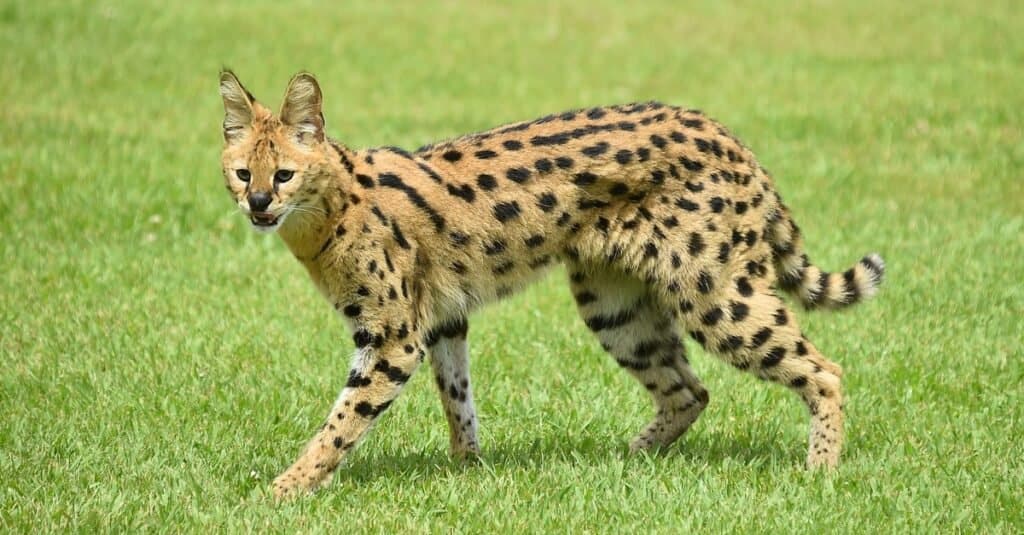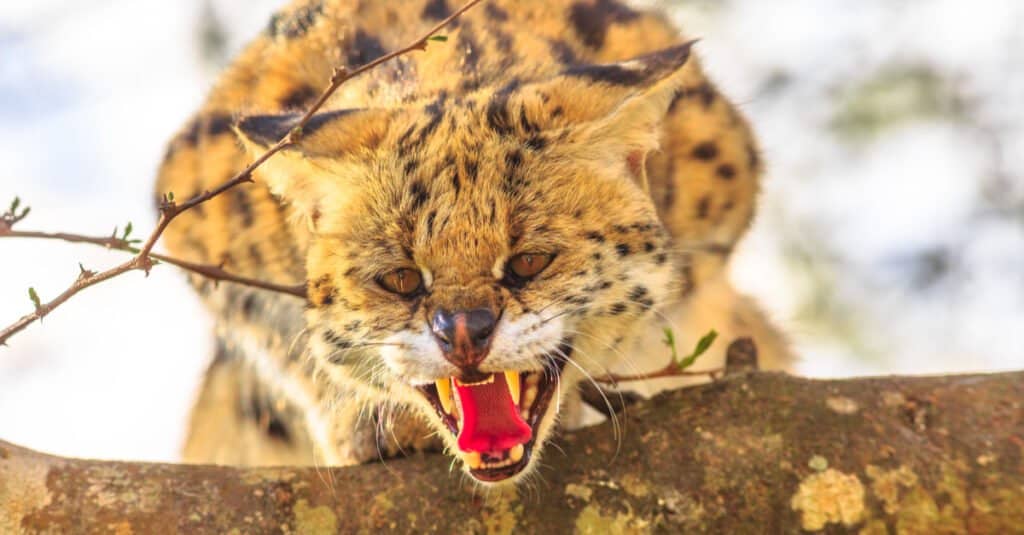Servals are wild cats native to sub-Saharan Africa, but do serval cats make good pets? With their large ears, narrow bodies, and distinctive spotted coats, they’re widely recognizable and appealing to cat enthusiasts. There are currently 19 known subspecies living in at least 35 African countries. They’re listed as Least Concern by the IUCN, but face threats from habitat loss, poaching, and human encroachment. Unfortunately, serval cats’ predilection for killing domesticated poultry often puts them at odds with humans, who retaliate by killing them.
Angry farmers aren’t the only ones who pose a threat to wild serval cats; they’re also hunted by poachers for the illegal wildlife trade. Their fur, teeth, and claws fetch high prices on the black market. Poachers also illegally capture wild serval cats and sell them to breeders for the exotic pet trade.
Here, we’ll take a closer look at why serval cats do not make good pets. Then, we’ll go over the exact reasons these wild animals should not be kept in homes. We’ll examine the ethics of purchasing an exotic serval cat as a pet, and the practicality of keeping one in a domestic setting. Next, we’ll take a look at the legality of owning a serval cat pet. Finally, we’ll examine some of the best alternatives to purchasing exotic animals in the same category as pets.
Can You Have a Serval Cat as a Pet?
Pet owners seek out serval cats because of their unique appearance and natural athleticism — their kittens are rather adorable too. They’ve long been known as the ‘designer cat’ of the exotic pet trade. However, their appearance notwithstanding, serval cat pets are not necessarily a good idea.
Servals are wild animals, and should not be kept as domesticated pets. Their appeal is understandable; they’re gorgeous animals. But, while many people may equate them with a domestic housecat, servals are a very different animal, and wildlife sanctuaries around the world agree: servals don’t belong in the home.
However, just because you shouldn’t have a pet serval cat, doesn’t mean you can’t purchase one. There are currently several states in the United States that allow people to purchase and keep servals. Several other states allow ownership with a permit, while ownership is outright illegal in most states. Additionally, serval cats are illegal to own in many Canadian provinces.
3 Reasons Servals Cats Do Not Make Good Pets
Serval cats may be cute, but that doesn’t mean they make good pets. They’re not housecats, which have been domesticated for thousands of years and thrive in residential settings. In contrast, serval cats are wild animals, and thrive only in wild settings. This also applies to serval/housecat hybrids, like the savannah cat.
Let’s take a look at the three most important reasons not to purchase a serval cat.

Serval cats do not make good pets
©alberto clemares exposito/Shutterstock.com
1. The Illegal Wildlife Trade
Unfortunately, no matter how reputable the breeder, no serval cat comes without a cost. In order to support the exotic pet trade, poachers illegally capture wild animals, and sell them to breeders. It is illegal to harvest serval cats from the wild like this. The illicit nature of these captures feeds the growing demand for all black market wild animals and wild animal parts, like elephant ivory, or tiger skins.
This means that, no matter how cute the serval, or how highly lauded the breeder, buying a serval cat (or any other exotic pet) supports the illegal wildlife trade. This is the same illicit trade responsible for the poaching and killing of rare and endangered animals, like other big cats, primates, and ivory-bearing creatures like rhinoceros and elephants. The black market exotic pet trade directly contributes to the loss of animal diversity across our planet.
2. Wild Animals Are Not Pets
Serval cats do not make good pets; they need large, fully enclosed outdoor spaces, and a specific diet of mostly raw meat. Even if they’re kept in the house from weaning, they’re likely to urine mark everything—frequently. Serval cats aren’t just difficult to housetrain, they’re also extremely intelligent and athletic. If their hunting instincts aren’t satisfied, they may develop behavioral issues.
When contemplating whether or not to purchase a serval cat, it’s important to remember that no wild animal deserves to live in the confines of a home. In the wild, servals roam large tracts of land in the African savannah, a far cry from sitting on a couch. Unlike housecats, serval cats have not been domesticated; they almost never last long in private homes. Frustrated owners often release them into the ‘wild’. At that point, they either starve to death, die by accident, or animal control picks them up and sends them to a big cat sanctuary.
3. Legality

Serval cats are illegal to own in many places; many conservation groups are currently pushing for federal ownership bans
©Benny Marty/Shutterstock.com
On top of the ethical concerns about purchasing a serval cat as a pet, there are also legal concerns. Servals are illegal to own in most states in the United States, and in several Canadian provinces. There are some U.S. states that allow ownership with a permit, and only a few that allow outright ownership of serval cats.
Currently, various wildlife conservation groups and big cat rescue organizations are pushing for a federal ban on serval cat ownership in the United States. This is largely due to the fact that the overwhelming majority of servals find their way to a big cat sanctuary (hopefully) after their owners discover the fraught nature of trying to house a wild animal as a pet.
Alternatives: Adopt a Bengal Cat
Still wishing you had a cute, spotted cat to add to your household, but unwilling to contribute to the illegal wildlife trade and all that comes with it? If you’re looking to spend money on a designer cat with exotic spots, look no further than the Bengal cat.
Bengals are not wild animals; they’re housecats with a small amount of Asian leopard cat DNA. This DNA (introduced in the fifties and sixties) gives the Bengal a unique spotted pattern; they look like tiny leopards. And the best part? By purchasing a Bengal, you’re not contributing to the poaching of endangered animals. Further, they’re no different from any other domestic housecat; they belong in homes, as pets, not in the wild.
The photo featured at the top of this post is © Howard Klaaste/Shutterstock.com
Thank you for reading! Have some feedback for us? Contact the AZ Animals editorial team.






